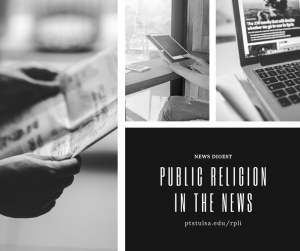Public Religion in the News Digest, November 15, 2019
 Nicholas Kristof’s review of Karen Armstrong’s The Lost Art of Scripture.
Nicholas Kristof’s review of Karen Armstrong’s The Lost Art of Scripture.
Karen Armstrong is a well-known scholar who writes books for an educated laity. I’m sure the book will be a good read. And the review per se, includes some wonderful lines. Here is an example:
The ancient Chinese scholar Xunzi complained about an early version of what today we might call religious blowhards. “The learning of the petty man enters his ear and comes out of his mouth,” Xunzi protested, adding that the words have affected only “the four inches between ear and mouth.” Instead, the aim for a wise man should be that learning “enters his ear, clings to his mind, spreads through his four limbs and manifests itself in his actions.”
Do evangelists have a right to approach us anyplace in public?
Do we have a right not to be evangelized and politicked? The right to be left alone in public spaces? The park has a speaker’s corner, but the evangelicals thought it is not the best place for evangelizing. Personally, I like the old British model of a Speaker’s Corner, a remnant of which still exists in Hyde Park, London.
Inflammatory speech and profit
Where is the line between government protected speech, a corporation’s social responsibility, and between speech I find offensive but which represents a point of view that should not be censored?
One of the problems is that these corporations (either social media platforms or those with a large social media footprint) are not government, public entities. However, they have become so ubiquitous and interwoven with such a significant cohort of society that they serve a quasi-public function.
“We’re really trying to pierce through this idea of ‘free speech’ that corporations use to defend themselves,” Bhatti said. “Free speech applies to governments not telling people what to do. You’re still making a decision about what is and isn’t OK. All of these corporations do censor, so they’ve made the decision that they’re willing to make money off of this particular type of bigotry because they believe the profit outweighs the damage it would do to their brand.”
Art, religion, and discovering/creating common ground.
What a wonderful idea, spearheaded by an Episcopal Church. An example of how the arts can foster gatherings and bonds between those who might not otherwise intersect. The book the authors reference, by Phyllis Trible and Letty Russell, is Hagar, Sarah, and Their Children.
Video clip: FOX News interview on public schools with a Christian homeschooling advocate
I have nothing against homeschooling per se. I do object to homeschooling advocates who aggressively seek to undermine and de-fund public schools.
There are SO many issues with what this interviewee says. It is unfair to compare public school teaching today with the way it was 30 years ago (or, for some of us, 50 or 60 years). Schools, teachers, school administrators do not want to keep expanding services and hours; they want to teach children. But, in order to teach children, there need to be more support services in order that kids are teachable. Yes, so many kids come from families that are struggling, and, yes, it would be great if government policy better supported (or, at least, did not hinder) families. But this interviewee does not want to see public schools, period.
NPR interviews with evangelicals, black and white, in North Carolina
This is a two-part episode. Audie Cornish interviews evangelicals at a Baptist church in North Carolina. In the first episode is more general in nature, as the members discuss faith and politics. In the second episode, Ms. Cornish digs into race. Black and white evangelicals share opinions about matters such as abortion and LGBTQ rights. However, on President Trump, they are polar opposites, with over 80% of white evangelicals supporting the President and the same percentage of black evangelicals not supporting him.
Churches: use excess property to build affordable housing:
This is an excellent use of land these days. Many possibilities for reducing homelessness, the need in high-rent areas for excess spending on housing, and for creating a revenue stream that can keep a core worshiping congregation going—with a strong mission.
Resistance to a church-sponsored homeless shelter in a Chicago suburb
I know this village. I have relatives who live there. If there are code violations that really pose a safety risk, sure, they need to be fixed. However, since NIMBY is so prevalent in more affluent suburban areas, a suspicion of motives is justified.


Leave a Reply